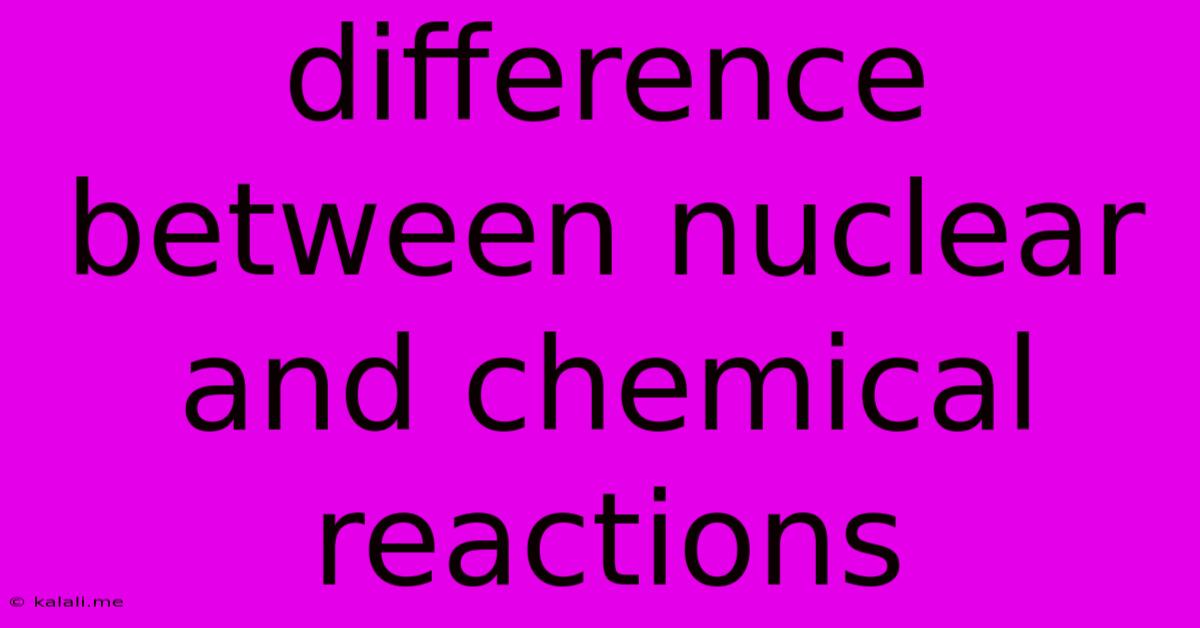Difference Between Nuclear And Chemical Reactions
Kalali
Jun 13, 2025 · 3 min read

Table of Contents
The Core Differences Between Nuclear and Chemical Reactions
Understanding the fundamental differences between nuclear and chemical reactions is crucial for grasping many scientific concepts, from energy production to the behavior of matter. While both involve transformations of substances, the scale and nature of these transformations are vastly different. This article delves into the key distinctions, exploring the changes in atoms, energy release, and the types of reactions involved.
What are Chemical Reactions?
Chemical reactions involve the rearrangement of atoms within molecules. This means that the bonds between atoms are broken and reformed, leading to the formation of new molecules with different properties. Crucially, the nuclei of the atoms remain unchanged. Think of it like rearranging building blocks—you're changing the structure of the building, but the individual blocks themselves stay the same.
Key Characteristics of Chemical Reactions:
- Atoms remain unchanged: Only electrons are involved in the process; the nucleus remains intact.
- Relatively small energy changes: The energy released or absorbed in chemical reactions is relatively small compared to nuclear reactions.
- Reaction rates are affected by external factors: Temperature, pressure, and catalysts can significantly influence the speed of a chemical reaction.
- Examples: Combustion (burning), rusting, digestion, photosynthesis.
What are Nuclear Reactions?
Nuclear reactions involve changes within the nucleus of an atom. This means that the protons and neutrons—the particles that make up the nucleus—are rearranged or altered. This can lead to the formation of entirely new elements or isotopes. It's more like dismantling and rebuilding the building blocks themselves, creating something entirely new.
Key Characteristics of Nuclear Reactions:
- Changes in atomic nuclei: Protons and neutrons are directly involved, leading to changes in the atomic number and mass number.
- Vast energy changes: Nuclear reactions release or absorb enormous amounts of energy, far exceeding that of chemical reactions.
- Reaction rates are less affected by external factors: Temperature and pressure have less of an impact on the rate of nuclear reactions compared to chemical reactions.
- Examples: Nuclear fission (splitting of a heavy nucleus), nuclear fusion (combining of light nuclei), radioactive decay.
Here's a table summarizing the key differences:
| Feature | Chemical Reaction | Nuclear Reaction |
|---|---|---|
| Involves | Rearrangement of electrons and bonds | Changes in the atomic nucleus |
| Atoms | Remain unchanged | May change (new elements formed) |
| Energy Change | Relatively small | Extremely large |
| External Factors | Significantly affect reaction rate | Less significantly affect reaction rate |
| Examples | Combustion, rusting, photosynthesis | Nuclear fission, nuclear fusion, radioactive decay |
Understanding the Implications
The vast difference in energy release is what makes nuclear reactions so powerful, both for beneficial applications like nuclear power and for devastating consequences like nuclear weapons. Chemical reactions, on the other hand, are essential for life itself, powering biological processes and driving industrial applications. By understanding these fundamental differences, we can better appreciate the power and importance of both chemical and nuclear processes in our world. This distinction is critical in fields ranging from materials science and energy production to medicine and environmental science. Further research into both areas continues to yield advancements and discoveries.
Latest Posts
Latest Posts
-
What Are The Differences Between Laminar Flow And Turbulent Flow
Jun 14, 2025
-
How Do You Spell 90 In Words
Jun 14, 2025
-
Least Common Multiple Of 10 And 40
Jun 14, 2025
-
Where Is The Air Pressure The Greatest
Jun 14, 2025
-
What Earthquake Waves Travel The Fastest
Jun 14, 2025
Related Post
Thank you for visiting our website which covers about Difference Between Nuclear And Chemical Reactions . We hope the information provided has been useful to you. Feel free to contact us if you have any questions or need further assistance. See you next time and don't miss to bookmark.